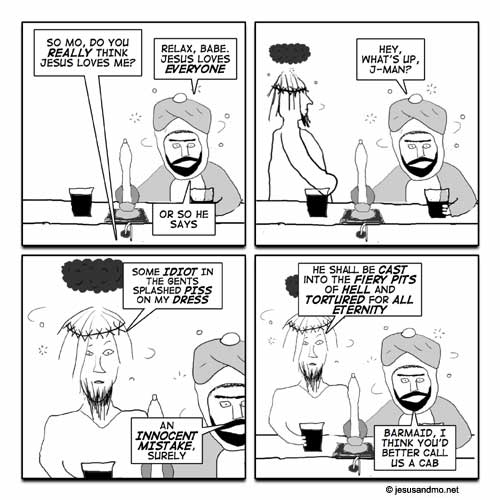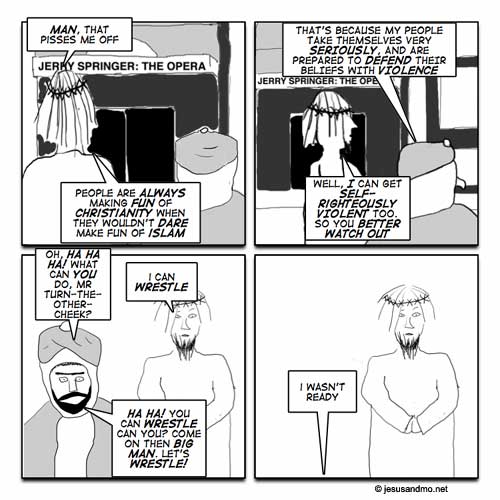That's it! I'm starting a riot.
*jumps and shoots into air*
lalalalalalala *Shooting sounds* lalalalalalalalal *shooting sounds*lalalal



That's it! I'm starting a riot.
*jumps and shoots into air*
lalalalalalala *Shooting sounds* lalalalalalalalal *shooting sounds*lalalal



You know when nothing is left to say post a cartoon.
You don't draw well.
Jesus was a religious leader.
Muhammad was religious leader and a military leader.
"My choice of Muhammad to lead the list of the world's most influential persons may surprise some readers and may be questioned by others, but he was the only man in history who was supremely successful on both the religious and secular level." --Michael H. Hart, THE 100: A RANKING OF THE MOST
INFLUENTIAL PERSONS IN HISTORY, New York: Hart Publishing Company, Inc.,
1978, p. 33.
In the first century the establishment of Islam upon the Arabian peninsula and the subsequent rapid expansion of the Arab Empire during the Muslim conquests, resulted in the formation of an empire surpassed by none before.[6] For the subjects of this new empire, formerly subjects of the vanishing Byzantine and Sassanid Empire, not much changed in practice. The objective of the conquests was more than anything of a practical nature, as fertile land and water were scarce in the Arabian peninsula. A real Islamisation therefore only came about in the subsequent centuries.[7]
For the polytheistic and pagan societies, apart from the religious and spiritual reasons each individual may have had, conversion to Islam "represented the response of a tribal, pastoral population to the need for a larger framework for political and economic integration, a more stable state, and a more imaginative and encompassing moral vision to cope with the problems of a tumultuous society."[8] In contrast, for sedentary and often already monotheistic societies, "Islam was substituted for a Byzantine or Sassanian political identity and for a Christian, Jewish or Zoroastrian religious affiliation."[8] Conversion initially was neither required nor necessarily wished for: "(The Arab conquerors) did not require the conversion as much as the subordination of non-Muslim peoples. At the outset, they were hostile to conversions because new Muslims diluted the economic and status advantages of the Arabs."[8]
Only in subsequent centuries, with the development of the religious doctrine of Islam and with that the understanding of the Muslim ummah, did mass conversion take place. The new understanding by the religious and political leadership in many cases led to a weakening or breakdown of the social and religious structures of parallel religious communities such as Christians and Jews.[8]
The caliphs of the Umayyad dynasty established the first schools inside the empire, called madrasas, which taught the Arabic language and Islamic studies. They furthermore began the ambitious project of building mosques across the empire, many of which remain today as the most magnificent mosques in the Islamic world, such as the Umayyad Mosque in Damascus. At the end of the Umayyad period, less than 10% of the people in Iran, Iraq, Syria, Egypt, Tunisia and Spain were Muslim. Only on the Arabian peninsula were there substantially more Muslims among the population.[9]
I just came accross this and thought I would share....
Muhammad was religious leader and a military leader.
Muhammad killed an estimated 3,000 people, including beheading 700 Jews of the Banu Qurayza tribe in Medina.
Muhammad received a fifth of the prisoners taken in battle, including women. (Sura 8:41)
Jesus never married.
Muhammad had many wives.
Muhammad forced followers to continue believing, "Whoever changed his Islamic religion, then kill him." (Hadith al-Bukhari, Vol. 9, Bk. 84, No. 57)
Muhammad taught it was blasphemy to call Allah your father (Sura 5:18)
Muhammad taught Allah has no image. (Sura 42:11, Sura 112:4)
Muhammad taught to avenge trespasses against your honor, family or religion.
Muhammad retaliated when violence was committed against him, ordering the death of his enemies.
Following Muhammad could be coerced, from the outside in.
A martyr in Islamic thought is one who dies for his faith while killing infidels.
Islam teaches individuals cannot have a personal relationship with Allah, as he is transcendent and unknowable.
Muhammad's religion is known for obedience and fear.
All of the caliphs who followed Muhammad led armies. (Caliphs Abu Bakr, Umar, Uthman, Ali, Muawiyya, the Umayyads, the Abbasids, etc.)
In the first 300 years of Islam, Muslim armies conquered Arabia, Persia, the Holy Land, North Africa, Spain, Southern France, Central Africa, and invaded vast areas of Asia and Asia Minor.
Muhammad's teaching on how to treat enemies:
Infidels are your sworn enemies (Sura 4:101).
Be ruthless to the infidels (Sura 48:29).
Make war on the infidels who dwell around you (Sura 9:123, 66:9).
Fight those who believe not in Allah nor the Last Day (Sura 9:29).
Strike off the heads of infidels in battle (Sura 47:4).
If someone stops believing in Allah, kill him (al-Bukhari 9:84:57).
Take neither the Jews nor the Christians for your friends (Sura 5:51, 60:13).
Never be a helper to the disbelievers (Sura 28:86).
Kill the disbelievers wherever we find them (Sura 2:191).
No Muslim should be killed for killing an infidel (al-Bukhari 1:3:111).
The only reward of those who make war upon Allah and His messenger will be that they will be killed or crucified, or have their hands and feet on alternate sides cut off, or will be expelled out of the land (Sura 5:33).
Is this one-sided, or would you say it is true?
Muhammad did own slaves (although apologists suggest no he didn't really "own" them - they volunteered to become his "slave" - you know metaphorically they were "slaves")
Michael
I just came accross this and thought I would share....
"A MAN TO EMULATE
Jesus was a religious leader.
Muhammad was religious leader and a military leader.
Jesus never killed anyone.
Muhammad killed an estimated 3,000 people, including beheading 700 Jews of the Banu Qurayza tribe in Medina.
Jesus never owned slaves.
Muhammad received a fifth of the prisoners taken in battle, including women. (Sura 8:41)
Jesus never married.
Muhammad had many wives.
Jesus never forced followers to continue believing. After Jesus made a difficult saying, "many of his disciples went back and walked no more with him. Then Jesus said to the twelve, 'Will ye also go away?' Then Simon Peter answered him, 'Lord, to whom shall we go? Thou hast the words of eternal life.'" (John 6:31-69)
Muhammad forced followers to continue believing, "Whoever changed his Islamic religion, then kill him." (Hadith al-Bukhari, Vol. 9, Bk. 84, No. 57)
Jesus taught God was our Father (Matthew 6:10).
Muhammad taught it was blasphemy to call Allah your father (Sura 5:18)
Jesus taught man was made in God's image. (Matthew 22:20, ref. Gen. 1:26-27, 9:6)
Muhammad taught Allah has no image. (Sura 42:11, Sura 112:4)
Jesus taught "forgive those who trespass against you." (Matthew 6:10-15)
Muhammad taught to avenge trespasses against your honor, family or religion.
Jesus did not retaliate when violence was committed against him, saying "Father, forgive them." (Luke 23:34)
Muhammad retaliated when violence was committed against him, ordering the death of his enemies.
Following Jesus was voluntary, from the inside out.
Following Muhammad could be coerced, from the outside in.
A martyr in Christian and Jewish thought is one who dies for his faith.
A martyr in Islamic thought is one who dies for his faith while killing infidels.
Christianity teaches God wants a personal relationship with each individual.
Islam teaches individuals cannot have a personal relationship with Allah, as he is transcendent and unknowable.
Jesus' religion is known for forgiveness and love.
Muhammad's religion is known for obedience and fear.
None of Jesus' Apostles led armies. A village did not receive Jesus "and when his disciples James and John saw this, they said, 'Lord, wilt thou that we command fire to come down from heaven and consume them, even as Elias did?' But he turned and rebuked them, and said, 'Ye know not what manner of spirit ye are of. For the Son of man is not come to destroy men's lives, but to save them.'" (Luke 9:52-56)
All of the caliphs who followed Muhammad led armies. (Caliphs Abu Bakr, Umar, Uthman, Ali, Muawiyya, the Umayyads, the Abbasids, etc.)
In the first 300 years of Christianity, there were 10 major Roman persecutions, and Christians were fed to lions in the Colosseum. Never did Christians lead an armed resistance against those who attacked them.
In the first 300 years of Islam, Muslim armies conquered Arabia, Persia, the Holy Land, North Africa, Spain, Southern France, Central Africa, and invaded vast areas of Asia and Asia Minor.
Jesus's teaching on how to treat enemies:
Love your enemies, bless them that curse you, do good to them that hate you, pray for them which despitefully use you (Matthew 5:44).
Resist not evil (Matthew 5:39).
If someone strikes you on one cheek, turn to them the other (Matthew 5:39).
If someone takes your coat, give them your shirt (Matthew 5:40).
If someone make you carry something one mile, carry it two (Matthew 5:41).
Forgive and you shall be forgiven (Matthew 6:14).
Judge not, that ye be not judged (Matthew 7:1).
Blessed are the peacemakers (Matthew 5:9).
Blessed are the merciful, for they shall obtain mercy (Matthew 5:7).
Ye have heard that it was said, Thou shalt not kill, but I say who ever is angry with his brother is in danger of the judgment (Matthew 5:21-22).
Treat others the same way you want them to treat you (Luke 6:27-36).
Feed the hungry, clothe the naked, visit the sick, whatever you do to the very least you have done unto me (Matthew 25:40).
Muhammad's teaching on how to treat enemies:
Infidels are your sworn enemies (Sura 4:101).
Be ruthless to the infidels (Sura 48:29).
Make war on the infidels who dwell around you (Sura 9:123, 66:9).
Fight those who believe not in Allah nor the Last Day (Sura 9:29).
Strike off the heads of infidels in battle (Sura 47:4).
If someone stops believing in Allah, kill him (al-Bukhari 9:84:57).
Take neither the Jews nor the Christians for your friends (Sura 5:51, 60:13).
Never be a helper to the disbelievers (Sura 28:86).
Kill the disbelievers wherever we find them (Sura 2:191).
No Muslim should be killed for killing an infidel (al-Bukhari 1:3:111).
The only reward of those who make war upon Allah and His messenger will be that they will be killed or crucified, or have their hands and feet on alternate sides cut off, or will be expelled out of the land (Sura 5:33).
http://worldnetdaily.com/index.php?fa=PAGE...mp;pageId=57615
"
Is this one-sided, or would you say it is true?
Your thoughts?
I don't think anyone disagrees that Jesus was a good man. Even Mohammed said he was his favorite Prophet.
Muslims call him Ruh'ullah, or the spirit of God.
You'll never find a Muslim who makes fun of Jesus or says anything bad about him.
If you do, it will have to be a really ignorant Muslim.
Hey lets not forget Adam and EveActually both Jesus and Mohammed are descended from Abraham, one from each son. Basic knowledge about Muslims and Christians, don't you know?
Arsalan - calling you an Apologist is a compliment. I'm very proud to be an apologist - when I am.First of all, please dont refer to me as an apologetic. I really hate that word. I would like to know why you keep referring to me as an apologetic?
First of all, please dont refer to me as an apologetic. I really hate that word. I would like to know why you keep referring to me as an apologetic?
Secondly, they didnt volunteer to be slaves. They were people who chose to be with him. You said you would provide proof that he had slaves. Yet you did not deliver. I gave you the hadith regarding many people you would call slaves but whom the Prophet always let decide whatever they wanted to do. Ofcourse, otally forget the fact that the Muslim state got rid of the word slave. Why? Because capturing and enslaving free men and women was not allowed. Weve had this dicussion havent we?
Arsalan, did Muslims buy and sell people during the last 1500 years?Secondly, they didnt volunteer to be slaves. They were people who chose to be with him. You said you would provide proof that he had slaves. Yet you did not deliver. I gave you the hadith regarding many people you would call slaves but whom the Prophet always let decide whatever they wanted to do. Ofcourse, otally forget the fact that the Muslim state got rid of the word slave. Why? Because capturing and enslaving free men and women was not allowed. Weve had this dicussion havent we?
Haa we are talking about invisible Sky Gods, winged magic horses, Xenu (PBUH) and DC10-looking UFOs, Perfect Books, and splitting moons ... are we not my dear?Michael first decides what his opinion is then creates facts to support his opinion.
Islam and slavery
The major juristic schools of Islam traditionally accepted the institution of slavery.[1] Muhammad and many of his companions bought, sold, freed, and captured slaves. Slaves benefited from Islamic dispensations which improved their situation relative to that in pre-Islamic society.[1][2] At the end of 19th century a shift in Muslim thought and interpretation of the Qur'an occurred, and slavery became seen as opposed to Islamic principles of justice and equality.[3] This interpretation has not been accepted by Wahhabis of Saudi Arabia.[4]
In Islamic law , the topic of Islam and slavery is covered at great length.[1] The Qur'an, the holy book, and the hadith, the sayings of Muhammed, see slavery as an exceptional condition that can be entered into under certain limited circumstances.[4] They also consider manumission of a slave to be one of many meritorious deeds available for the expiation of sins.[5] For a variety of reasons, internal growth of the slave population was not enough to fulfill the demand in Muslim society. This resulted in massive importation, which involved enormous suffering and loss of life from the capture and transportation of slaves from non-Muslim lands.[6] In theory, slavery in Islamic law does not have a racial or color component, although this has not always been the case in practice.[7]
The Arab slave trade was most active in West Asia, North Africa and East Africa. and by the end of the 19th century such activity had reached a low ebb. In the early 20th century (post World War I) slavery was gradually outlawed and suppressed in Muslim lands, largely due to pressure exerted by Western nations such as Britain and France.[4] However, slavery claiming the sanction of Islam is documented presently in the African republics of Chad, Mauritania, Niger, Mali and Sudan.[8][9][10]
